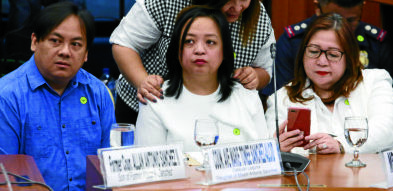
Convicted Caluan Mayor Antonio Sanchez’ s family lead by eldest son Allan, daughters Ave Marie and Antonelvie and wife Elvira during the Senate hearing on GCTA used to justify the release of convicted criminals.
INQUIRER/ MARIANNE BERMUDEZ
MANILA, Philippines — The wife of convicted rapist and killer Antonio Sanchez on Tuesday insisted he was innocent and that they would not pay the P12.67 million awarded by the court to the families of his victims, Eileen Sarmenta and Allan Gomez, as indemnity.
Elvira Sanchez spoke at a Senate inquiry on the good conduct time allowance law and her husband’s botched early release from New Bilibid Prison where he and six of his henchmen were serving seven 40-year prison terms for the rape and murder of Sarmenta and the murder of Gomez in 1993.
She made the remarks in response to Minority Leader Franklin Drilon’s questions about the unpaid compensation imposed on her husband by the court that found him guilty in 1995. “Actually, your honor, we really have no intention [of paying],” she said.
“I am telling the truth,” she added. “On the day that they said Eileen was raped and Allan was killed, my husband was in our home, with me and our daughter Ave Marie.”
But Drilon said the Sanchez family had already raised that defense during the trial and the court had ruled on the case.
He noted that the Sanchezes were refusing to indemnify the families of the two University of the Philippines Los Baños students even as they sought help from various influential people to secure a pardon or executive clemency for the former Calauan, Laguna, mayor.
One of the people the Sanchez family had written to was President Duterte’s spokesperson and legal adviser Salvador Panelo, who was the former mayor’s lawyer during the trial.
What DOJ can do
As a remedy for the victims’ families, Drilon urged the Department of Justice (DOJ) to seek a writ of execution from the court to compel the Sanchezes to pay.
“Wouldn’t justice dictate that your prosecutors should move for the issuance of a writ of execution for the family to pay P12,671,900, which is already final and executory, as a matter of policy, as a matter of justice?” he told Justice Secretary Menardo Guevarra.
“It is so unjust that here is Mayor Sanchez who is asking for clemency and who refuses to pay P12.6 million,” he added.
Guevarra agreed the DOJ could try doing that, or assist the private counsel handling the civil aspect of the case. But he also lamented that his predecessors had not taken that action, noting that there was a prescriptive period for the writ to be sought.
In response, Drilon told Guevarra to let the court decide the legal issues related to the indemnity payments. What was important, he said, was that the DOJ should take the initiative to show that it was interested in pursuing justice.
Lack of remorse
Sen. Richard Gordon asked Guevarra whether the former mayor’s refusal to indemnify his victims’ families and show remorse qualified him for good conduct time allowance.
The DOJ chief replied that the lack of remorse and refusal to pay “speak so much about the moral fiber of the person concerned.”
“In my opinion, that is something that should be taken into account as well when the PDL’s [person deprived of liberty] good conduct or behavior is the subject of consideration,” Guevarra said.
Gordon said the Board of Pardons and Parole should consider the lack of remorse when reviewing applications for clemency or pardon.
The Senate opened on Monday its inquiry into the good conduct law, or Republic Act No. 10592, which would allow a reduction of a convict’s jail time based on good behavior.
The law, passed in 2013, drew attention from the public and lawmakers after reports broke that the former mayor was to be freed based on it.
Public outrage, however, prompted DOJ officials to stop his release. They said he was disqualified after all for being convicted of heinous crimes and for violating prison regulations.